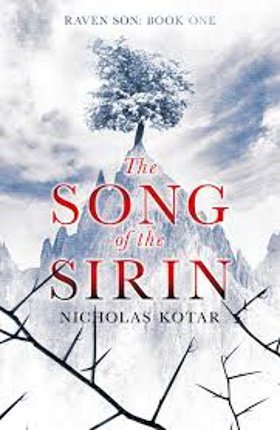The Pilgrim
It was a few hours after midday on the same day, as far as Voran could tell in the enormous dark of leaves. He walked in a direction he hoped would lead him back to known paths, but he still recognized few of the trees or hills. The undergrowth was so thick that Voran suspected he had stumbled on a true wildwood. He didn’t know there were any left in Vasyllia, for though there were few outlying villages outside the city proper, many Vasylli had been woodsmen in their time, and hardly an inch of copse, plain, or grove was undiscovered.
One thought niggled the back of his mind, where he tried in vain to keep it contained. It whispered that he was no longer in Vasyllia at all, that he had entered a different realm from the human. Though he had just encountered not one, but three legendary creatures, Voran was not yet ready to believe all the Old Tales to be true.
He stumbled out of the murk of oaks into the breathing space of an alder-grove. He was exhausted. Laying down his bow, quiver, and sword, he sat at the base of a young tree and leaned back.
He should be more worried about losing his way. His provisions were few, he had drunk all his water before midday, and poor Lebía would be frantic with worry. But he found he cared little for any of that. He was not even anxious to find Vasyllia. Nothing mattered so much as finding the Sirin, as hearing her song again.
A kind of echo of the music thrummed through him stronger than his own heartbeat. Whenever he stopped moving, everything around him moved with the rhythm of the Sirin’s song. The wind tossed the branches in her cadence; the birds chirped in unison. His own heart and breath began to move with it, until he thought he would go mad with its insistence.
It was not the music itself, he realized. It was the incompleteness of it. The Sirin had sung, but not to him. To the trees and the beasts, perhaps, to the summits and rivers, but not to his heart. The thought held a creeping dread. If her incomplete song had caused him to go half-mad, what would happen if she directed her song at him? Nevertheless, to contemplate the possibility of not hearing the song again terrified him, like a childhood dream of a parent’s death.
As for finding her, none of the Old Tales were particularly helpful. The Sirin were capricious, appearing in their own good time, in their own chosen place. You did not seek out the Sirin, they sought you out. But he had no intention of waiting patiently for the song to return. He needed to do something.
The stag. Somehow, the white stag and the Sirin were connected. He couldn’t exactly understand how, but it made sense on a level of intuition. The stag was of a different world, the world of the tales, the world that never encroached on everyday life. At least until today. If he found the stag again, perhaps it would lead him to the Sirin.
His heart accelerated. Why had he not considered it before? The Dar would have already gathered the hunting party to search for the stag. All of Vasyllia—rich third-reacher and poor first-reacher alike—would be lounging in pavilions and on wool blankets before the city, feasting and awaiting the return of the hunters. Perhaps they had caught the trail already? He must stop them at all costs.
He tried to jump up, but found that his limbs were not responding to the commands of his mind. His eyelids were heavy, his head drooped, hungry for sleep. What had come over him? He had hardly been out for half a day!
Then the realization speared him. He was stuck in a sleeping-wood. By the Heights, surely that old story wasn’t true as well?
Out of the corner of his vision, a hairy creature waddled toward him. He couldn’t move his head to see it clearly. He heard a porcine snuffle, though it was far too large to be a tree-pig. It stood up on two hind legs, growing in the process, all matted hair and dirt and encrusted leaves. It growled.
Something changed in the music of the grove. At first, Voran couldn’t place it, then he realized it was the birds. They no longer sang in rhythm to the Sirin’s song, but to another music, more somber and ancient. Every branch in his vision hopped with purple, red, golden, brown songbirds. There was even a firebird trilling on one of the larger branches. The hairy creature snuffled back into the oaks.
“You shouldn’t amble through these woods, young man. The Lows of Aer are not to be lightly entered. All manner of strange things are possible here.”
Voran strained to move his jaw, and realized that nothing held him in place any more. He jumped up so suddenly that the speaker took two alarmed steps back and raised a walking stick in warning.
“I’m sorry, master,” said Voran, eager to make amends. “I didn’t mean to startle you.”
“No harm done, young man.” The voice was as harsh as rock grating on rock, though it had an uncanny melody. It oddly harmonized with the birdsong. “Tell me, what brings you to the Lows?”
The man’s face was wrapped in some coarse grey fabric, though a beard poked out of it here and there. He was a huge man, out-gaining Voran by at least a head, and Voran was of the warrior caste. Something about him suggested incredible age, but he moved confidently, like a young man. Voran urgently wanted to make friends with this strange man.
“I am lost. My name is Voran, son of Otchigen of Vasyllia.”
The man’s grey eyes flashed like the sun reflecting off new snow. “The son of Otchigen? You are far from home, young man. How long have you traveled, then?”
Something in the pit of Voran’s stomach twisted. “Only this day. I hunted the white stag.”
Voran expected the man to laugh, but instead he unwrapped his face, revealing a smile of recognition. Like the beard, the man’s entire face resembled carved stone.
“Ah, a fellow seeker. What good fortune. I am a Pilgrim, young Voran.”
Voran could not believe his luck. Pilgrims were unnamed wanderers who traveled all lands searching for the beautiful and the terrible. They were whispered to have a special grace of Adonais. Meeting a Pilgrim in the wild was more valued than catching a questing beast; hosting a pilgrim brought one’s family years of prosperity. Many a well-bred housewife would brave open war with her neighbors for the sake of a Pilgrim’s visit.
“Good fortune indeed, master! Where do your feet take you this day?” Voran hoped he remembered the correct traditional address to a Pilgrim from his seminary days.
“My feet go where they will, young Voran.” The Pilgrim bowed his head, acknowledging the formality gratefully. Voran’s shoulders relaxed. “But meeting you perhaps has indicated a surer path. You wish to return to Vasyllia? It will take a week, at least, if you take the usual paths.”
Voran’s mouth must have dropped open in shock, because the Pilgrim laughed—if harsh rock can be imagined to laugh—and tapped his chin with his stick.
“You meddled with the Powers, young man. No telling what sort of trouble you’ve gotten yourself into.”
“Pilgrim, what do you know of the Sirin?”
The Pilgrim stiffened in suspicion. “Why do you ask? Have you not been chastened enough for your curiosity?”
“Forgive me. It is just…I have seen a Sirin. I have heard her song.”
The Pilgrim’s eyebrows rose a fraction and his eyes widened a jot, but his body remained still. Voran imagined it took great effort to appear so little moved.
“White stag,” the Pilgrim murmured, more to himself than to Voran, “Sirin-song…Is it that time already?” He seemed to make up his mind about something, and now his gaze was firm. “Come, Voran, I will take you to Vasyllia a different way.”

Everywhere the Pilgrim went, holloways seemed to carve themselves through the trees. Where Voran saw nothing but trees, the Pilgrim picked out alleys between birches, passages through beeches, and doors through sage-brush. It was like the land belonged to him. As though seeing with new eyes, Voran was inundated with details of the forest he had never before bothered to notice, and he wanted to stop to breathe in the warm birch-smell, to pick out the male sparrow’s call from the female’s, to run his fingers through rain-soaked juniper for the joy of the sticky drops. But he had to run to keep up with the long strides of the Pilgrim.
“Pilgrim, what was that thing in the sleeping-wood? How did you scare it off?”
The Pilgrim stopped walking, turning to Voran. “That? Oh, nothing but a harbinger.” He smiled at something. “Things stir in the deepwoods. Things you Vasylli have not seen, or even heard of, for a very long time.”
He continued forward with even more determined tread.
“Voran, tell me something. While traveling, I have heard tales about your father. Are any of them true?”





















